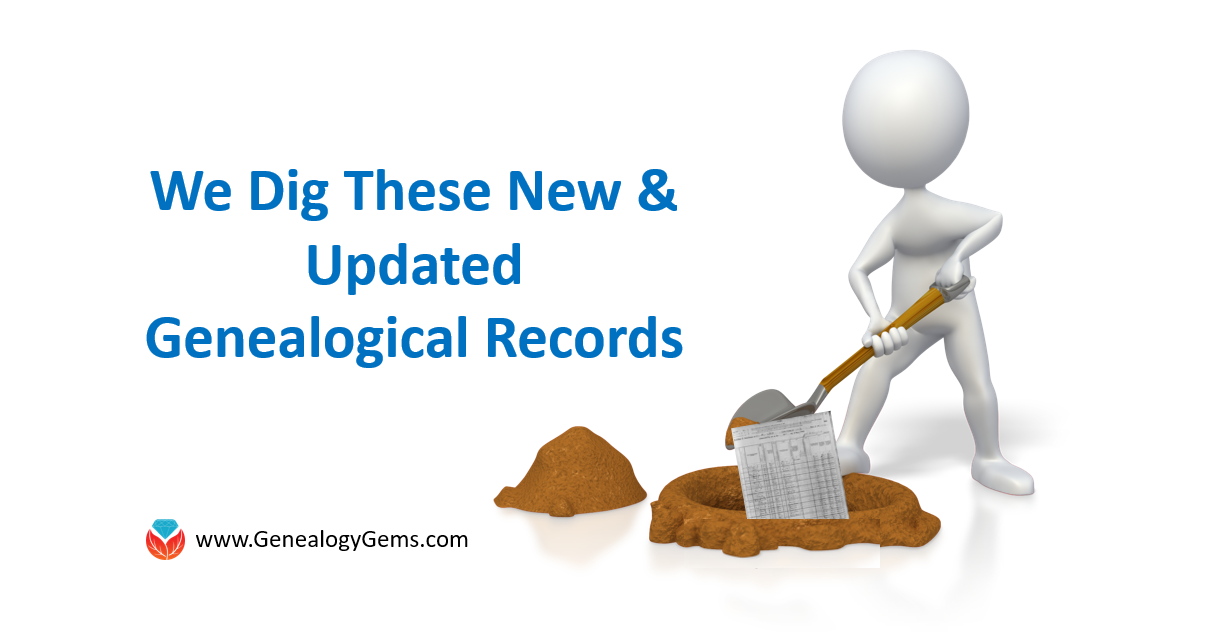Find Your Ancestors in the Scotland Census Now at FamilySearch
Is that the sound of bagpipes? It might be, because the Scotland 1901 Census is now available at FamilySearch! Learn more about what you’ll find in this collection and get top tips from a Scottish genealogy expert on how to find your ancestors is in Scottish records. Then we head over to Central and South America for exciting new and updated genealogy collections for the Bahamas, Panama, and Brazil.
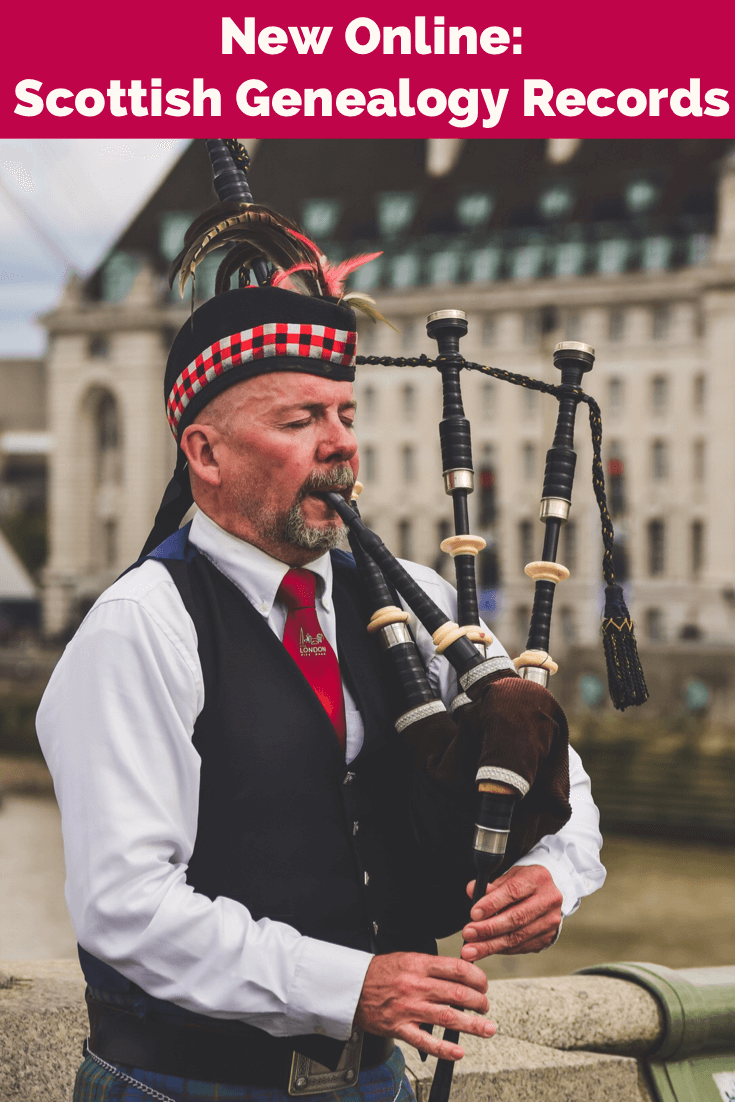
Scotland Census Now at FamilySearch
Does your family tree have roots in Scotland? You’re in luck! You can now search for your tartan-clad ancestors for free at FamilySearch! The Scotland Census, 1901 contains almost 4.5 million records for those living in Scotland on Sunday March 31, 1901.
“These records are comprised of Enumeration forms that were distributed to all households before the census night and the complete forms were collected the next day by the enumerators. Included in this series are returns from ships of the Royal Navy at sea and in ports abroad.
Click here to search these records at FamilySearch now.
This collection is also available on Findmypast. If you have a subscription to Findmypast, you can access the 1901 census that includes Scotland, England, and Wales. Click here to search at Findmypast.
UPDATE: The original FamilySearch press release contained incorrect information about the source of the 1901 census records. Visit the National Records of Scotland website here for more information about the 1901 census.
According to the National Records of Scotland website, they hold records of the census of the population of Scotland for 1841 and every tenth year thereafter (with the exception of the wartime year of 1941 when no census was taken) and of the sample census of 1966. Census records are closed for 100 years under the Freedom of Information (Scotland) Act 2002.”
3 Strategies for Finding an Ancestor in Scottish Records
If your love of tartan, bagpipes, and kilts equals your love of family history research, you are likely hoping to find an ancestor who was born in Scotland. Or perhaps nothing would surprise you more than to find a Scottish ancestor. In either case, the next step is to find this ancestor in Scottish records.
As with all immigrants, the first step to finding them in their homeland is to research their lives extensively in America before searching for them in Scottish records. Scottish genealogy expert Amanda Epperson, PhD joins us here on Genealogy Gems to share some of her top strategies to help you find your ancestors in Scottish records. Click here to read more!
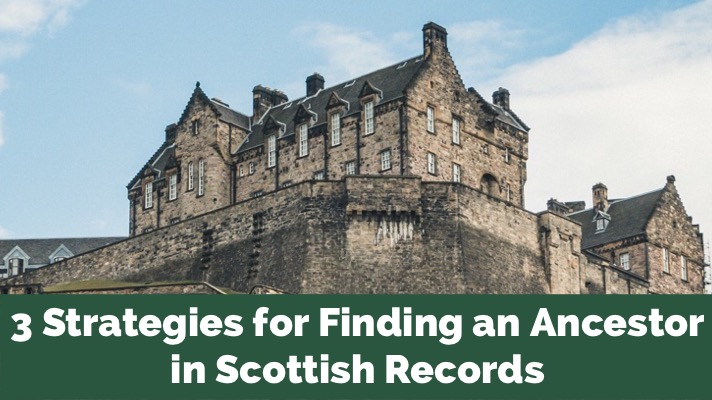
New Genealogy Records for the Bahamas
Findmypast has been making major strides in expanding its collection to include rare and underrepresented records. The newest addition is the Bahamas Birth Index 1850-1891. Discover your Bahamian ancestors in this online index of registered births from the British Crown Colony of The Bahamas.
Birth records are essential to expanding your family tree. There are tens of thousands of records in this collection, giving information not only about relatives born in the Bahamas but also their parents. Click to search the Bahamas Birth Index 1850-1891.
Panama Records Indexes
Three new indexes containing just under half a million vital records from the Republic of Panama have recently joined Findmypast’s growing collections of international records. There are now four collections for Panama:
- Panama Baptism Index 1750-1938
- Panama Death Index 1840-1930
- Panama Marriage Index 1800-1950
- Gorgas Hospital Panama Canal Mortuary Registers 1906-1991
These new additions consist of baptisms, marriages and deaths spanning the years 1750 to 1950 and will generate hints on Findmypast family trees. (Learn more about Findmypast’s new tree hinting feature by clicking here.)
Brazil Civil Registrations
FamilySearch has a new genealogy collection for South America: Brazil, São Paulo, Civil Registration, 1925-1995. Boasting nearly 2 million records, this data set includes births, marriages, deaths, and indexes created by various civil registration offices in the state of São Paulo. Some of these records have been indexed and are searchable as part of this collection. Additional images and indexed records will be published as they become available.
These records are in Portuguese so you may want to take a look at these resources for help with these records:
Bring genealogy records to life with Google Earth!
Genealogists love making discoveries in records, but the excitement of documents doesn’t exactly translate to the non-genealogists in your family. Capture your family’s imagination by telling their family history story with Google Earth. See how easy it is to turn the genealogical information you’ve collected into compelling multi-media stories. These tours will help everyone in your family appreciate your genealogical research and protect as a legacy for generations to come. Enjoy!
About the Author: Lisa Louise Cooke is the producer and host of the Genealogy Gems Podcast, an online genealogy audio show and app. She is the author of the books The Genealogist’s Google Toolbox, Mobile Genealogy, How to Find Your Family History in Newspapers, and the Google Earth for Genealogy video series, and an international keynote speaker.
Disclosure: This article contains affiliate links and Genealogy Gems will be compensated if you make a purchase after clicking on these links (at no additional cost to you). Thank you for supporting Genealogy Gems!
Free Genealogy Records from Around the World: Newly Online!
Free genealogy records, newly available online, may be able to take you around your ancestor’s world! This week’s record destinations include Australia, Belgium, Brazil, Bolivia, Canada, Chile, Dominican Republic, France, Italy, Netherlands, Nicaragua, Russia, and South Africa.

Civil registration records–key genealogical resources–from several countries are among the free new family history records online in recent days and weeks. But you’ll also find probate records, church records, military personnel records, and even a digital archive meant to preserve ancient aboriginal languages. Which might mention your ancestors?
Argentina
Over 100,000 indexed names have been added to FamilySearch’s free collection, Argentina, Entre Ríos, Catholic Church Records, 1764-1983. According to a collection description, it includes “baptisms, confirmations, marriages and burials for cities in the province of Entre Ríos.”
Australia
An exciting new Australian website houses a digital archive of Aboriginal and Torres Strait Islander language materials. It includes texts, audio, video, and ebooks about Australia’s First Nations languages. The hope of the site is to be a digital repository for gathering, preserving, and sharing materials that in effect preserve these languages and revitalize their use. The site managers will continue to work with partners to bring more content to the site. Click here to read more about the site’s launch, and click here to access it directly.
Belgium
Two free Belgian civil registration collections at FamilySearch.org have been updated:
Both of these collections are comprised of civil registration of births, marriages, and deaths from the Belgium National Archives, as well as marriage proclamations, marriage supplements, and some original indexes. Additional images will be added as they become available.
Brazil
Several free Brazilian genealogy records collections have been updated at FamilySearch.org. Among them are the following:
- Pernambuco, Civil Registration, 1804-2014 (more than 300,000 newly indexed records)
- Piauí, Civil Registration, 1875-2013 (nearly 150,000 newly indexed records)
- Brazil, São Paulo, Immigration Cards, 1902-1980 (over 20,000 newly indexed records)
Bolivia
Over 300,000 indexed names have been added to FamilySearch.org’s enormous free collection of Bolivia Catholic Church Records, 1566-1996. The collection hosts over 1.5 million digitized images of Catholic Church records created by parishes in Bolivia. “These records include: baptisms, confirmations, marriages, pre-marriage investigations, deaths, indexes and other records. Some of these records have been indexed and are searchable as part of this collection. Additional indexed records will be published as they become available.”
Canada
Library and Archives Canada continues to update its free Personnel Records of the First World War database. So far, the database includes “digitized files for many individuals of the Canadian Expeditionary Force and the Royal Newfoundland Regiment and Newfoundland Forestry Corps (courtesy of the Rooms Provincial Archives).”
Newly digitized CEF files are added to the references every two weeks, states the collection’s landing page. To date, over 461,000 of an expected 640,000 files have been added. “Library and Archives Canada is digitizing the service files systematically, from box 1 to box 10686, which roughly corresponds to alphabetical order,” explains a blog post. “Please note that over the years, the content of some boxes has had to be moved and, you might find that the file you want, with a surname that is supposed to have been digitized, is now located in another box that has not yet been digitized.”
Chile
FamilySearch.org has updated its free collection, Chile Civil Registration, 1885-1903. These include “births, marriages, and deaths for various localities in Chile from 1885 to 1903. For a complete list of all the provincias and comunas included in this collection, see the Provinces of Chile – Civil Registration coverage table. Only records from a few localities have been indexed. More records and images will be added as they become available.” Need help reading these? FamilySearch suggests using this Spanish Genealogical Word List, which also links to other translation tools.
Dominican Republic
Over 175,00 indexed names have been added to FamilySearch’s free collection, Dominican Republic Civil Registration, 1801-2010. Spanning over 200 years, the collection includes images of births, marriages, and deaths as well as some divorces and indexes. “Some of these records have been indexed and are searchable as part of this collection,” states the collection description. “Additional images and indexed records will be published as they become available. These records were obtained from public access sources in the Dominican Republic.”
France
FamilySearch has updated its collection of indexed Catholic parish record images for Coutances et d’Avranche Diocese, 1533-1894. Baptisms, marriages, and burials are all included. “Parishes within this diocese are within the boundaries of the department of Manche,” states a collection description. “French commission for Informatics and Liberties (CNIL) does not allow publication of sensitive data below 150 years.”
Italy
FamilySearch continues to publish more Italian civil registration records! These are some of the latest:
- Asti, 1803-1814, 1911-1935. Over 50,000 indexed records have been added to this existing collection.
- Bergamo, 1866-1901. Over 25,000 indexed names have been added to this database.
- Chieti, 1866-1930. Over a half million browsable images comprise this new collection.
- Macerata, 1808-1814. Over 90,000 browsable images are in this new collection.
Netherlands
Just shy of a million records have been added recently to FamilySearch’s free collection, Netherlands, Archival Indexes, Miscellaneous Records. “Archives around the Netherlands have contributed indexes which cover many record sources, such as civil registration, church records, emigration lists, military registers, and land and tax records,” says the collection description. “These records cover events like birth, marriage, death, burial, emigration and immigration, military enrollment and more. These indexes were originally collected, combined and published by OpenArchives.”
Nicaragua
There are now over two century’s worth of records in the free FamilySearch collection, Nicaragua Civil Registration, 1809-2013. It includes “births, marriages, deaths, and other records created by civil registration offices in various departments of Nicaragua.” Civil registration in Nicaragua didn’t begin until 1879, and it appears that most records in this collection date from that year or later.
Paraguay
Nearly 125,000 browse-only images have been added to FamilySearch.org’s free collection, Paraguay Miscellaneous Records, 1509-1977. According to the site, “These records include two complete collections: Sección Nueva Encuadernación (Rebinding Section) and Sección Propiedades y Testamentos (Properties and Wills Section). Copies of the original records are housed at the Archivo Nacional in Asunción, Paraguay. The “Propiedades y Testamentos” section can give a brief look at the personal wealth of clerics, economic bases of resident foreigners in Paraguay, or the fortunes of a given family over a period of time.”
Russia
FamilySearch.org has updated its free collection, Russia, Samara Church Books, 1779-1923. It includes “images and partial index to records of births and baptisms, marriages, deaths and burials performed by priests of the Russian Orthodox Church in the province of Samara. These records were acquired from the state archive in that province.” Another brief statement in the collection description illustrates the incremental and ongoing nature of record additions to FamilySearch: “Currently this collection is 4% complete. Additional records will be added as they are completed.”
South Africa
Over 40,000 indexed records have been added to the free FamilySearch.org collection, South Africa, Transvaal, Probate Records from the Master of the Supreme Court, 1869-1958. The records are described simply as “probate records from the Master of the Supreme Court, Transvaal, South Africa. Original records are located in the Transvaal Archives Depot, Pretoria, Republic of South Africa.
Spotlight on probate records
 Probate records detailed the final settling of our ancestors’ financial assets. They often contain rich genealogical information and interesting insights into a person’s life. They are among the many records you might find at courthouses and government archives. More U.S. probate records are coming online (click here to learn more), but even if you have to visit a courthouse yourself or hire someone to do it for you, it’s often worth it. Click here to read why.
Probate records detailed the final settling of our ancestors’ financial assets. They often contain rich genealogical information and interesting insights into a person’s life. They are among the many records you might find at courthouses and government archives. More U.S. probate records are coming online (click here to learn more), but even if you have to visit a courthouse yourself or hire someone to do it for you, it’s often worth it. Click here to read why.
Thanks for sharing this post with those who will want to know about these free genealogy records online!

We Dig These Gems! New Genealogy Records Online
Here’s our weekly roundup of new genealogy records online that caught our eye. This week there are a lot of US records: Alabama Episcopal church registers, Connecticut sourt records, Kansas probate records and New York Evening Post death notices. Immigration records for Brazil and Italian civil registrations are also on the list!
ALABAMA CHURCH. The Birmingham Public Library’s index to Alabama Episcopal Church registers (1832-1972) is now also searchable on Ancestry as a Web Index (click here to learn about Ancestry Web Indexes). The index includes “confirmations, baptisms, marriages and burials for more than 14,000 people in sixteen Alabama parishes for the period of the 1830s to the 1970s.”
BRAZIL IMMIGRATION. Over 2.2 million indexed records have been added to a free FamilySearch collection of Brazil Rio de Janeiro Immigration Cards (1900-1965). These records, in Portuguese, “contains immigration cards issued by Brazilian buy tapeworm medication dogs consulates around the world. These cards were then presented at the port of entry by foreigners visiting or immigrating to Brazil through the port of Rio de Janeiro from 1900-1965.”
CONNECTICUT COURT. Over a quarter million indexed records have been added to FamilySearch’s free index to Connecticut District Court naturalizations (1851-1992)
ITALY CIVIL REGISTRATION. Nearly a quarter million indexed records have been added to FamilySearch’s free collection of Italian civil registrations for Taranto, 1809-1926.
KANSAS PROBATE. Ancestry’s collection of Kansas wills and probate records has been freshly updated. Kansas wills and probate records The current database covers nearly two centuries (1803-1987) and covers at least some time periods in nearly half of Kansas’ 105 counties.
NEW YORK DEATHS. An index to over 100,000 death notices from the New York Evening Post (1801-1890) is now available to subscribers at AmericanAncestors.org. “Page images and an index searchable by first and last name, location, and year are included.”
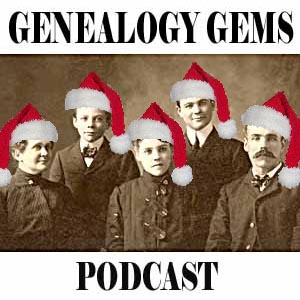 Merry Christmas and Happy New Year!
Merry Christmas and Happy New Year!
Disclosure: This article contains affiliate links and Genealogy Gems will be compensated if you make a purchase after clicking on these links (at no additional cost to you). Thank you for supporting Genealogy Gems!
Trace Your Irish Ancestors with Four Historical and Geographical Tips
Let’s trace your Irish ancestors! Irish research tips are a must-have for this historically violent little island. Senior Researcher at Legacy Tree Genealogists, Kate Eakman, shares with you four historical and geographical tips to get you off to the right start.
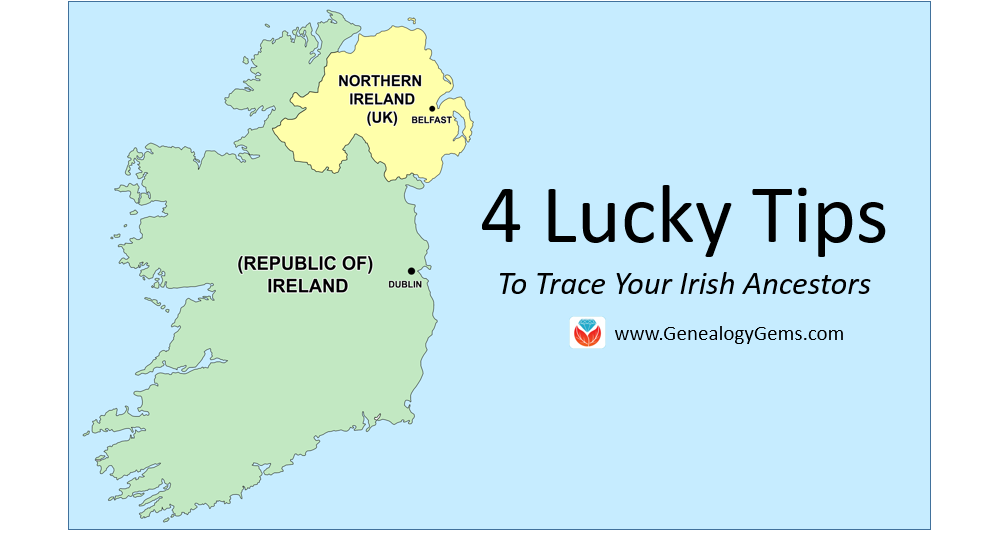
By Jonto at English Wikipedia [GFDL (http://www.gnu.org/copyleft/fdl.html) or CC-BY-SA-3.0 (http://creativecommons.org/licenses/by-sa/3.0/)], via Wikimedia Commons
Trace Your Irish Ancestors: 4 Tips

Kate Eakman from Legacy Family Tree Genealogists
Irish research can be difficult. Although the island is small–about the same size as the state of Indiana–its violent history and many divisions makes research complicated. In addition, many United States records simply report our ancestors were from Ireland with no indication of the county of their birth. However, knowing a little bit about the history and geography can provide the necessary clues. Here are four tips that can help you trace your Irish ancestors from the United States back to Ireland.
Tip 1: Understand the Island of Ireland Today
There are two distinct political entities on the island of Ireland: Northern Ireland and the Republic of Ireland. The dividing line was drawn by England in 1922. This is an important date to keep in mind when searching for more recent Irish ancestors.
The Republic of Ireland, or Eire, is an independent nation made up of the southern 26 counties of Ireland. The Republic of Ireland is predominantly Catholic, with about 3% of the population identifying itself as Protestant. Indices and links to copies of the civil birth records for the years 1864 to 1915, marriages between 1882 and 1940, and death records between 1891 and 1965 are available for free from the IrishGenealogy website. (These records include those of the Northern Irish counties up to 1922.) Official copies can be ordered from the General Records Office in Dublin.
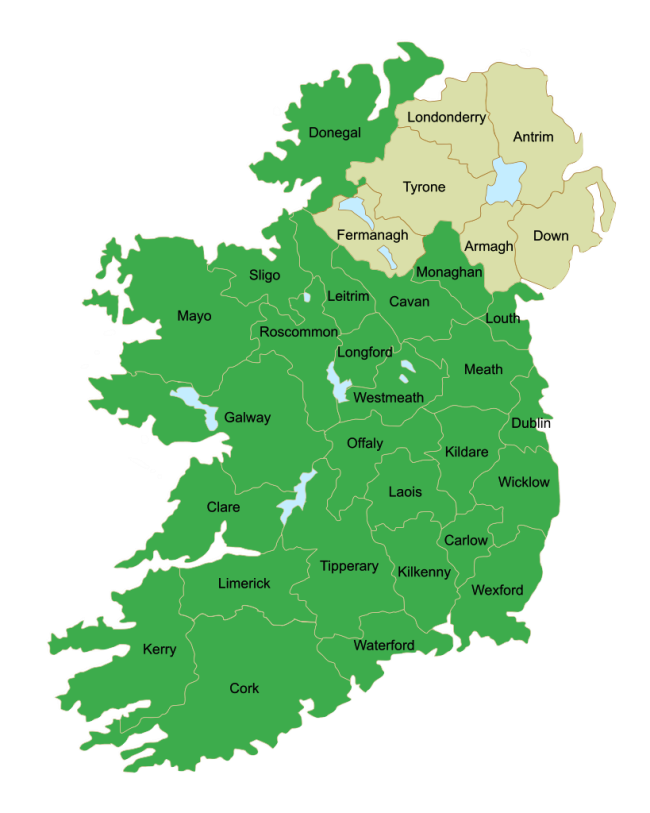
Map of the counties of Northern Ireland and the Republic of Ireland. Photo courtesy https://commons.wikimedia.org.
Northern Ireland, also known as Ulster, is a part of the United Kingdom–although it is self-governing like Canada or Australia. Although the counties of Northern Ireland are not officially used today, it is comprised of the traditional counties of Antrim, Armagh, Down, Fermanagh, Tyrone, and Londonderry (also known by the more traditional name of Derry). Although most Americans believe that Northern Ireland is a Protestant nation, the reality is that today there are almost an equal number of Catholics as there are Protestants in Northern Ireland. Civil birth, marriage, and death records can be ordered from GRONI (General Records Office Northern Ireland).
Tip 2: Turn to U.S. Census Records
From the 1880 U.S. Census through the 1920 U.S. Census, Irish ancestors who immigrated to the United States, or whose parents were natives of Ireland, simply reported they were natives of Ireland. However, since the 1930 U.S. Census was taken after the creation of the Republic of Ireland in 1922, it often noted the specific country from which ancestors originated.
In this sample (below) from the 1930 U.S. census, we can see John O’Reilly was born in “North. Ireland,” as were his mother and her parents. His father, however, was from the Irish Free State, or the Republic of Ireland. This information tells us where to search for John’s birth: in one of the six counties of Northern Ireland. His mother’s birth record will also be from Northern Ireland, and probably his parents’ marriage record also, since it is more traditional to marry in the bride’s hometown than the groom’s.
There is the potential that a much larger search will be necessary for John’s father’s birth record unless the marriage record can be found and it specifies in which of the 26 Republic of Ireland counties he was born.

John J. O’Reilly and his mother in the 1930 U.S. Census report. The detail shows where John was born, then his father’s place of birth, followed by his mother’s place of birth. The second line was the same information for John’s mother. Images courtesy http://ancestry.com.
If your Irish ancestor, or the child of that ancestor, is listed in the 1930 U.S. census, pay close attention to where they reported they and their parents were born. You might find a very helpful clue in that census report.
Tip 3: Look to Religion for Clues
While many people associate Roman Catholicism with Ireland, there are many Protestants living in Northern Ireland and fewer in the Republic of Ireland. Knowing your family’s historical religious preference can provide a small hint. If your family has always been Catholic it is likely they were Catholics in Ireland. However, as we have already noted, with almost all of the Republic of Ireland expressing a preference for Catholicism and about 45% of the citizens of Northern Ireland claiming allegiance to the Catholic faith, you can see a Catholic religious heritage is not particularly unique.
However, if your family history includes the Episcopal faith, or there is something that references “the Church of Ireland” in your family’s records, then your family was most likely Protestant when they lived in Ireland. You are also more likely to find your Protestant ancestors in Northern Ireland (with the understanding that there are Protestants throughout the Republic of Ireland).
If your family is or has been Presbyterian, there is a very strong likelihood your family is actually Scots-Irish with your ancestors immigrating to Ireland from Scotland, bringing their Scottish religion with them. You will find most of these ancestors in Northern Ireland.
Tip 4: Move on to Military Records
World War I (1914-1918) was particularly brutal to the Irish. More than 30,000 of the 200,000 men who enlisted were killed in this war. Songs such as “Gallipoli” and “The Foggy Dew” mourned the loss of so many young Irish men in foreign wars, especially since the 1922 Irish War of Independence followed closely on the heels of World War I.
If one of your Irish ancestors fought and died in World War I, you can find his name and more at the website Ireland’s Memorial Records. Many (but not all) of the memorials include the county in which the soldier was born, as seen below:
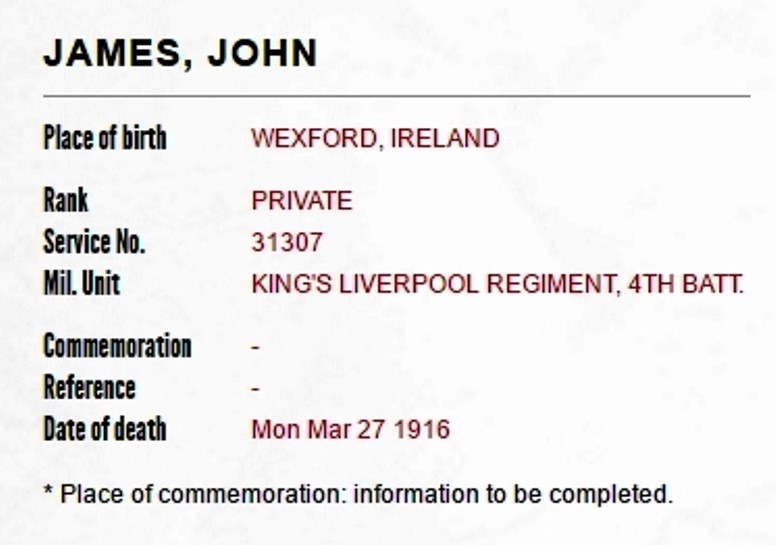
Memorial for John James of County Wexford. Courtesy Ireland’s Memorial Records.
Another website, Ireland’s World War I Veterans 1914-1918, has created a PDF list, updated every three months, which contains over 35,000 names of Irishmen who fought in World War I. If you know or suspect your Irish ancestor may have served in World War I and survived the experience, this is an excellent place to find a clue about his origins.
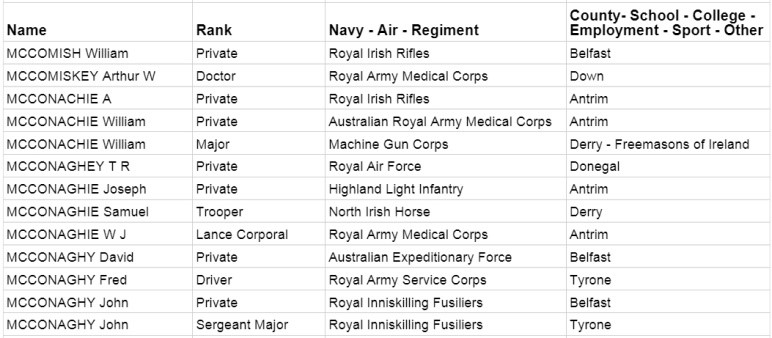
A sample of the list of those who served as created by Ireland’s World War I Veterans 1914-1918.
Although it can be difficult to find the correct place in Ireland for your family’s origins, there are some important clues, both historical and geographical, that can help you pinpoint a place to begin your search in Ireland.
Trace Your Irish Ancestors: In Conclusion
 The 1930 U.S. census can provide an important clue to trace your Irish ancestors, as can your family’s religious heritage. If an Irish ancestor served in World War I, you may be able to determine the county in which he was born. A knowledge of the differences between Northern Ireland and the Republic of Ireland, as well as their location and the counties within those two countries, can help you contact the proper vital records office for those all-important vital records. So, go n-éirí leat! Good luck!
The 1930 U.S. census can provide an important clue to trace your Irish ancestors, as can your family’s religious heritage. If an Irish ancestor served in World War I, you may be able to determine the county in which he was born. A knowledge of the differences between Northern Ireland and the Republic of Ireland, as well as their location and the counties within those two countries, can help you contact the proper vital records office for those all-important vital records. So, go n-éirí leat! Good luck!
The team of expert genealogists at Legacy Tree Genealogists can help bust through your brick walls. They do the research and you enjoy the discoveries!

